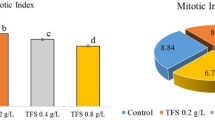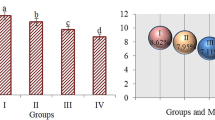Abstract
IN order to test the activity of teratogenic drugs in embryonic vegetal tissues, we have examined mitoses of plant cells which proliferate rapidly, such as those present in radical apices of Liliaceae, in the presence of a compound with a proved action on man (α-(N-phthalimido) glutarimide (thalidomide))1. The biological material used for these experiments was the common onion (Allium cepa} in the root apical cells of which the mitotic frequency is high and the figures show up clearly.
This is a preview of subscription content, access via your institution
Access options
Subscribe to this journal
Receive 51 print issues and online access
$199.00 per year
only $3.90 per issue
Buy this article
- Purchase on Springer Link
- Instant access to full article PDF
Prices may be subject to local taxes which are calculated during checkout
Similar content being viewed by others
References
Taussig, Helen B., and Baltimore, M. D., J. Amer. Med. Assoc., 180, 1106 (1962).
Author information
Authors and Affiliations
Rights and permissions
About this article
Cite this article
GIACOMELLO, G., MALATESTA, P. & QUAGLIA, G. Action of Thalidomide on Radical Meristems of Allium cepa. Nature 201, 940–941 (1964). https://doi.org/10.1038/201940a0
Issue Date:
DOI: https://doi.org/10.1038/201940a0
This article is cited by
-
Silver ciprofloxacin (CIPAG): a successful combination of chemically modified antibiotic in inorganic–organic hybrid
JBIC Journal of Biological Inorganic Chemistry (2018)
-
Absence of Growth Effects of Thalidomide on Higher Plants
Nature (1965)
Comments
By submitting a comment you agree to abide by our Terms and Community Guidelines. If you find something abusive or that does not comply with our terms or guidelines please flag it as inappropriate.



